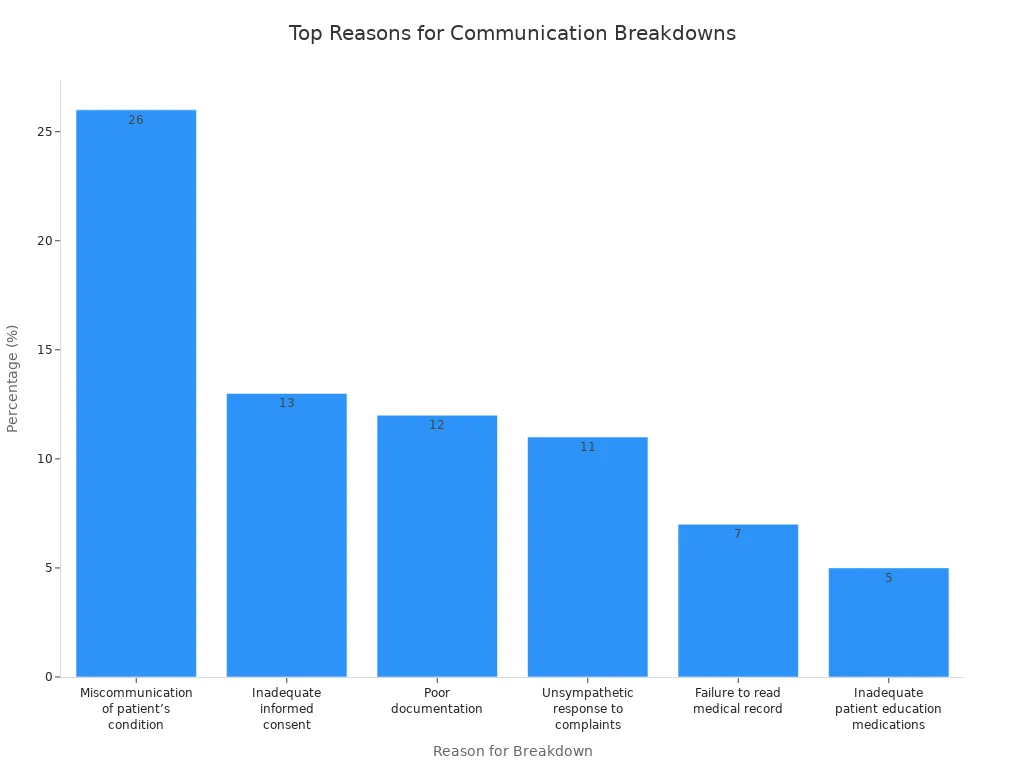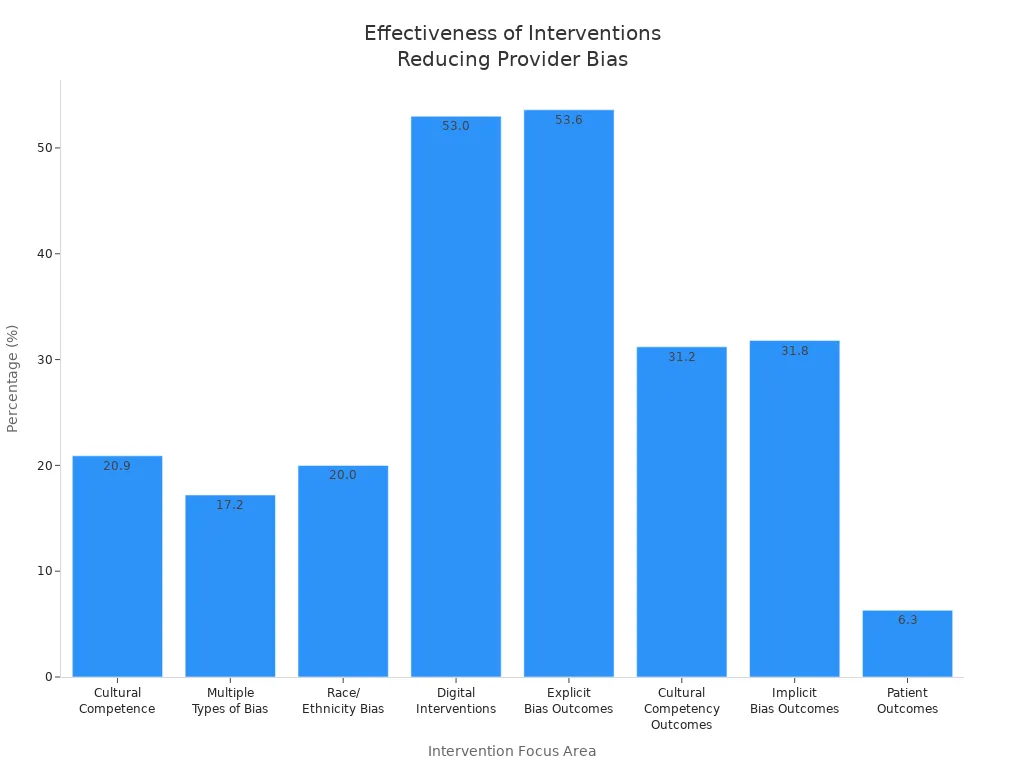Medical Gaslighting: When Healthcare Providers Dismiss Symptoms

Have you ever left a doctor’s office feeling like no one listened to you or like your symptoms were not real? You are not the only one. Medical Gaslighting happens when you tell your doctor about your worries, but they do not listen or act like your problems are not important. Many people feel like they do not matter when this happens.
More than half of patients in the United States say their symptoms are ignored, not believed, or brushed off.
This number goes up to 60% for people in the Hispanic community.
You should get care that takes your symptoms seriously. Keep reading to find help and easy steps you can use.
Key Takeaways
Medical gaslighting happens when doctors ignore patients' symptoms. This can make patients feel like no one is listening to them. It can also make them feel like they do not matter.
Some signs of medical gaslighting are getting a diagnosis without a real checkup. Another sign is being told your symptoms are 'all in your head.'
Patients can help themselves by writing down their symptoms. They should ask clear questions. They can also bring someone they trust to their appointments.
Good talking between patients and doctors is very important. It helps stop confusion and makes sure patients get the right care.
If you feel ignored or not listened to, you can ask another doctor for help. Getting a second opinion can help you get better care. It can also help you trust doctors again.
Medical Gaslighting Defined

Medical Gaslighting is when someone in healthcare makes you question your own symptoms or feelings. You might feel like no one cares or listens to you. This can happen to both patients and healthcare workers. It often happens when people with power control the talk or ignore your worries.
Medical gaslighting means gaslighting happens between doctors, patients, groups, or hospitals. This shows how power and authority work in medical places. Both patients and healthcare workers can be affected.
Key Signs
You might see some signs if you go through Medical Gaslighting. These signs can make you feel like you do not matter. Here are some common things that can happen:
Giving a diagnosis without checking you well
Ignoring or making your symptoms seem small
Not talking about your worries or questions
Guessing things about you without asking
Saying your symptoms are 'all in your head'
Not letting you get tests or see other doctors
Blaming or shaming you for your problems
Saying rude things or acting like you are less
Talking over you or not letting you speak
Telling you not to get another doctor’s opinion
Some doctors may ignore women’s health problems or say physical symptoms are just feelings. You might see your worries are not taken seriously. The doctor may not ask more questions or show they care.
Some thinking mistakes that can cause gaslighting are: Anchoring, which means focusing too much on one idea; Premature closure, which means stopping before getting all facts; Confirmation, which means only looking for proof of the first guess; Diagnostic overshadowing, which means blaming new symptoms on old problems.
Common Experiences
Many people have the same stories about Medical Gaslighting. You might feel upset or stop trusting doctors. Some people say the hurt feelings are worse than the pain. You might stop believing in yourself or not want to see a doctor again.
Very bad experiences with healthcare
Late diagnosis and having to speak up for yourself
Health gets worse and you feel hurt inside
Hiding your feelings when you see a doctor
Trying to handle things on your own and talk better
Thinking your symptoms must be really bad to get help
Feeling sad about lost time or untreated sickness
Not trusting, being scared, and staying away from doctors
Not telling doctors about all your symptoms
You might think your symptoms are not important enough to share. Some people feel sad about lost time or health getting worse because no one listened. You might not trust doctors, even if you later find a good one.
Patients say they feel upset and do not trust the medical system.
Feeling hurt inside is common, and some say it is worse than being hurt physically.
Gaslighting can make you lose trust in yourself and avoid doctors for a long time.
Not trusting doctors can last even after you meet someone who helps.
If you see these signs or feel this way, you are not alone. Medical Gaslighting can make you doubt yourself, but your symptoms and feelings are real.
Not Sure If You Are Been Gaslighted?
Sometimes it's hard to recognize gaslighting and emotional manipulation. Our Gaslighting Check app helps you identify patterns and provides personalized guidance based on your specific situation.
Why It Happens
Systemic Factors
Medical Gaslighting often happens because of problems in healthcare. Many doctors do not get enough training to listen well. Some hospitals have rules that make it hard for you to speak up. Power differences between you and your doctor can make you feel ignored. These problems can happen to anyone. They are even worse for some groups.
Bias and prejudice can cause unfair treatment, especially for LGBTQ+ people
Power differences between doctors and patients can affect care
Doctors also have too much work and not enough time. A survey from HealthCentral found that over 94% of patients felt ignored. When doctors rush, they may not listen or check your symptoms well. This can make you feel like your worries do not matter.
Bias and Stereotypes
Bias and stereotypes are a big part of Medical Gaslighting. Sometimes, doctors let their own beliefs change how they treat you. This can lead to unfair care, especially if you are in a group that faces discrimination.
Medical gaslighting is when a doctor ignores a patient’s real health problem without checking carefully. This can happen because of bias or not enough knowledge. It shows how bias can make doctors ignore what patients say.
You can see which groups are most at risk in the table below:
Patient Population | Evidence |
|---|---|
BIPOC communities | Black, American Indian, and Hispanic patients are two times more likely to die from COVID-19 complications. |
LGBTQIA+ individuals | Nearly 10% of LGBQ individuals had a doctor refuse to see them due to sexual orientation. |
Almost 30% of transgender individuals were denied care because of their gender identity. | |
Women | Women are often subjected to biases in healthcare, leading to disparities in treatment. |
Individuals with disabilities | This group faces significant barriers and biases in healthcare settings. |
Overweight or obese individuals | Stereotypes about weight can lead to gaslighting in medical contexts. |
Adolescents | Young patients may be dismissed or not taken seriously by healthcare providers. |
The elderly | Older adults may experience biases that affect their care and treatment. |
Individuals with mental health conditions | Stigma surrounding mental health can lead to gaslighting experiences. |
Low socioeconomic status | Economic disparities can exacerbate experiences of medical gaslighting. |
Non-native language speakers | Language barriers can lead to misunderstandings and biases in care. |
Communication Gaps
Problems with talking to your doctor can also cause Medical Gaslighting. If you cannot explain your symptoms well, your doctor may not understand. Many women say it is hard to talk about their health problems. In fact, 66% of women have trouble explaining their condition. 81% feel misunderstood by their doctor.
"It is common to feel misunderstood by your doctor. This can make you feel alone and sad." - Rachel Kaplan, Licensed Clinical Social Worker.
Common reasons for communication breakdowns include:
Reason for Communication Breakdown | Percentage (%) |
|---|---|
Miscommunication of the patient’s condition | 26 |
Inadequate informed consent | 13 |
Poor documentation | 12 |
Unsympathetic response to patient complaints | 11 |
Failure to read the medical record | 7 |
Inadequate patient education regarding medications | 5 |

When doctors and patients do not understand each other, mistakes can happen. You may not get the care you need. You might feel alone or upset. Good communication is very important to stop Medical Gaslighting.
Risks and Impact

Missed Diagnoses
If your symptoms are ignored, you can be in danger. You might not get the right tests or care. This can mean doctors miss or delay finding out what is wrong. Many serious health problems are missed when doctors do not listen. Some of these missed problems are:
Heart attacks
Strokes
Breast cancer
Sepsis
Pulmonary embolism
Autoimmune diseases like lupus or rheumatoid arthritis
Doctors might say your symptoms are not serious. For example, they might call a cough allergies. Dizziness or numbness might get called anxiety. These mistakes can make your health worse.
Psychological Harm
Medical Gaslighting does not just hurt your body. It can also hurt your mind and feelings. If doctors ignore you, you may feel sad or upset. You might start to doubt yourself. Many people stop trusting doctors. People with chronic illnesses feel even worse when this happens. You may notice your self-esteem and mental health get worse. Women often say it is harder to speak up or lead in healthcare. Feeling upset can last a long time. Kind healthcare workers can help you trust again.
When your doctor ignores you, you can feel alone and powerless. You should be listened to.
Healthcare Avoidance
If you have a bad visit, you might not want to go back. This can make your health problems worse. If you stay away from doctors, treatable sickness can get worse. You might face bigger health risks or even death. Anxiety and depression can get stronger. Waiting too long can make treatment not work as well. You may suffer more than needed.
Not going to the doctor can hurt your health.
You might feel more anxious or sad.
Waiting too long can make care less helpful.
Taking your symptoms seriously helps keep you healthy.
What Patients Can Do
Self-Advocacy
You should speak up about your health. Trust what you feel and notice. Your symptoms are important, even if someone ignores them. Many people bring a friend or family member to their appointments. This person can help you feel brave and remember your questions. Before you see your doctor, write down your symptoms and what you want to ask. This helps you stay on track. Ask your doctor to explain things clearly and write down your worries. If you feel like no one is listening, you can find a new doctor. Patient advocacy groups and therapists can help you deal with the feelings from Medical Gaslighting.
Patient education programs help you feel more in charge. Most people who finish these programs say they have fewer mistakes and better health.
Communication Tips
Talking clearly helps you get the right care. Use easy words when you talk about your symptoms. Do not use hard medical words. Watch your body language. Sit still and look at your doctor. Be kind and listen, but also ask questions that need more than yes or no. For example, you can ask, "Can you tell me more about this?" Repeat what you heard to make sure you understand. This helps you and your doctor agree.
Technique | Description |
|---|---|
Sit Down and Be Humble | Sitting during visits builds trust and lowers worry. |
Use Simple, Jargon-Free Language | Everyday words help you know what is wrong. |
Be Mindful of Non-Verbal Cues | Body language can make talking easier. |
Show Empathy and Compassion | Sharing feelings helps you talk honestly. |
Use the Teach-Back Method | Repeat what you learned to make sure you get it. |
Create a Safe Environment | A calm place helps you talk about your symptoms. |
Ask Open-Ended Questions | Ask questions that need longer answers. |
Seeking Second Opinions
You should get answers about your health. If you feel ignored or confused, ask another doctor for help. This is very important for cancer, bone problems, arthritis, skin issues, brain problems, stomach troubles, and hormone problems. A new doctor might have different ideas or answers. Do not be afraid to find someone who listens and cares about your worries.
"The program helps patients learn about their health, talk better with doctors, and stand up for themselves, which leads to better health.
For Healthcare Providers
Listening Skills
You can help patients feel safe by listening well. Good listening shows patients that you care about what they say. Try these ways to listen better:
Curious listening means asking questions that need more than yes or no.
Trust-earning listening means you do not judge, so patients feel safe.
Proximate listening means you pay attention and do not get distracted.
Empowering listening means you use feedback from patients and staff to get better.
Resilient listening means you help your team so everyone can do their best.
When you listen closely, patients feel important. They share more facts and follow the doctor’s advice. This helps them get better care and feel happier. Studies show that patients trust doctors more when they feel heard. They are also more likely to come back for more care.
Reducing Bias
Bias can change how you treat patients. You can lower bias by learning about other cultures and thinking about your own ideas. Many clinics teach staff how to see and stop bias. The table below shows which ways work best:
Intervention Focus Area | Percentage (%) | Number of Studies (n) |
|---|---|---|
Cultural Competence | 20.9 | 23 |
Multiple Types of Bias | 17.2 | 19 |
Race/Ethnicity Bias | 20.0 | 22 |
Digital Interventions (post-2020) | 53.0 | N/A |
Explicit Bias Outcomes | 53.6 | N/A |
Cultural Competency Outcomes | 31.2 | N/A |
Implicit Bias Outcomes | 31.8 | N/A |
Patient Outcomes | 6.3 | N/A |

You can also help by asking patients for feedback and talking about Medical Gaslighting with your team. Risk managers or ombudsmen can look at complaints and help make care safer. Coaching and talking about bias often makes your clinic safer for everyone.
Supportive Care
Supportive care means making sure patients feel listened to and cared for. When you talk in a kind way, you build trust. This helps patients share more about their health. This way, care gets better and Medical Gaslighting happens less.
Patients who feel listened to and cared for will not feel gaslighted. With good talks, doctors are more likely to order the right tests and treatments. Over 40 years of research show that kind communication helps with this and more.
You can make a safe place by:
Letting everyone talk openly and learn from mistakes.
Using clear rules and always learning new things.
Using technology to keep track of patient data and stop mistakes.
Letting patients help make choices about their care.
Working together as a team to help each other and your patients.
When you focus on supportive care, patients feel safe and respected. This builds trust and helps everyone stay healthy.
You are important in stopping Medical Gaslighting. If you speak up and ask questions, your care gets better. Doctors and nurses should listen, care, and learn about all people. Studies show that trust grows when doctors talk clearly and make choices with you.
Write down your symptoms and what happens at visits.
Take a friend or family member with you to the doctor.
Ask for notes about your visit and get help if you need it.
You should always feel listened to and respected. By working together, you and your doctors can make care safer and kinder for everyone.
FAQ
What should you do if you feel dismissed by your doctor?
You can write down your symptoms before your visit. Ask clear questions. Bring someone you trust. If you still feel ignored, you can seek a second opinion.
How can you tell if you are experiencing medical gaslighting?
You may notice your doctor ignores your symptoms, talks over you, or says your problems are not real. Trust your feelings. If you feel unheard, you might be experiencing medical gaslighting.
Can medical gaslighting happen to anyone?
Yes, anyone can face medical gaslighting. People from minority groups, women, and those with chronic illnesses often report it more. You deserve respect and care, no matter who you are.
Is it okay to change doctors if you feel gaslighted?
You have the right to choose your healthcare provider. If you feel dismissed or unsafe, you can find a new doctor who listens and takes your symptoms seriously.